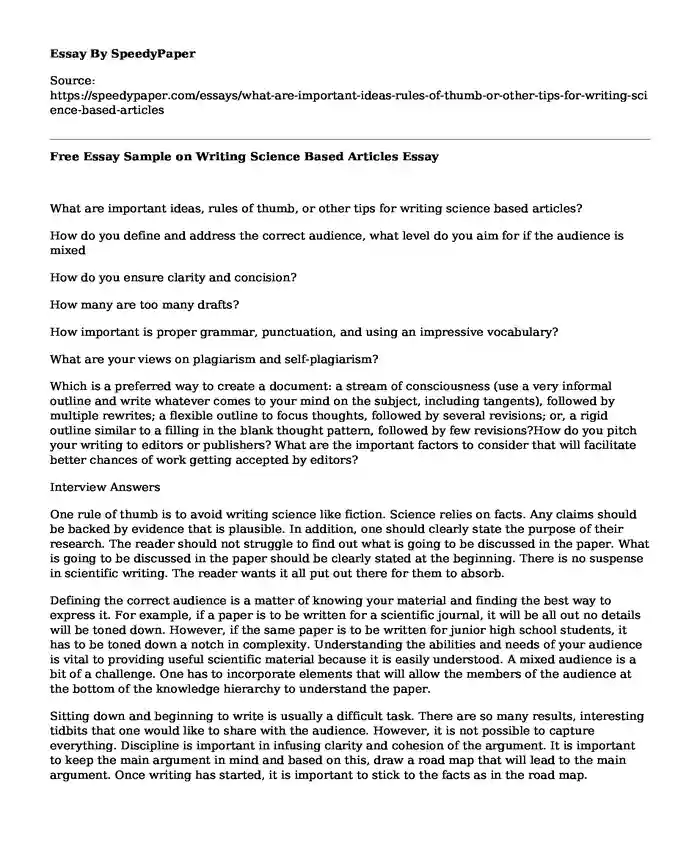What are important ideas, rules of thumb, or other tips for writing science based articles?
How do you define and address the correct audience, what level do you aim for if the audience is mixed
How do you ensure clarity and concision?
How many are too many drafts?
How important is proper grammar, punctuation, and using an impressive vocabulary?
What are your views on plagiarism and self-plagiarism?
Which is a preferred way to create a document: a stream of consciousness (use a very informal outline and write whatever comes to your mind on the subject, including tangents), followed by multiple rewrites; a flexible outline to focus thoughts, followed by several revisions; or, a rigid outline similar to a filling in the blank thought pattern, followed by few revisions?How do you pitch your writing to editors or publishers? What are the important factors to consider that will facilitate better chances of work getting accepted by editors?
Interview Answers
One rule of thumb is to avoid writing science like fiction. Science relies on facts. Any claims should be backed by evidence that is plausible. In addition, one should clearly state the purpose of their research. The reader should not struggle to find out what is going to be discussed in the paper. What is going to be discussed in the paper should be clearly stated at the beginning. There is no suspense in scientific writing. The reader wants it all put out there for them to absorb.
Defining the correct audience is a matter of knowing your material and finding the best way to express it. For example, if a paper is to be written for a scientific journal, it will be all out no details will be toned down. However, if the same paper is to be written for junior high school students, it has to be toned down a notch in complexity. Understanding the abilities and needs of your audience is vital to providing useful scientific material because it is easily understood. A mixed audience is a bit of a challenge. One has to incorporate elements that will allow the members of the audience at the bottom of the knowledge hierarchy to understand the paper.
Sitting down and beginning to write is usually a difficult task. There are so many results, interesting tidbits that one would like to share with the audience. However, it is not possible to capture everything. Discipline is important in infusing clarity and cohesion of the argument. It is important to keep the main argument in mind and based on this, draw a road map that will lead to the main argument. Once writing has started, it is important to stick to the facts as in the road map.
There can never be too many drafts. Quality cannot be compromised. It is important to keep drafting until something succinct is developed. Drafts are important because in each draft there is a manner in which the ideas are expressed. The final goal is to express the ideas in the best possible way. The number of drafts do not really matter in my opinion but the justifies the means. So long as there is something good at the end of the writing process, the number of drafts does not matter to me.
Proper grammar and punctuation are non-negotiable. To express ideas in grammatically correct and punctuated writing adds to the quality of writing and appeal to the audience. Grammar and punctuation cannot be compromised on; they are part of the foundation that requires clarity and cohesion for good expression of ideas in writing. Good writing speaks for itself and there is no need for impressive vocabulary. Keep it simple and it will speak for itself.
Plagiarism and self-plagiarism are unethical in as much as they are an impediment to the advancement of good writing. Scientific writing cannot advance with plagiarism and self-plagiarism. These two things will lead writing to go around in circles and no advancement. In addition, they are an impediment to innovation and quality in writing.
There are many ways to do the same thing, to each, their own. I prefer a flexible outline to focus thoughts, followed by several revisions. In this way, I can add what I find important and omitted or remove what I think is not a high priority. This manner of writing affords flexibility and allows me to get into the writing process much faster than other methods.
First, editors do not like jargon. What they see that they do not like, they cannot accept. Secondly, editors have an audience, be sure to appeal to the audience the editor wants material for. Remember to be factual in your writing. Do not state what you cannot prove. Also, avoid metaphors where possible and if they are used, use them sparingly. It is also important to input the factors of good writing that ensure the paper is interesting and not a statement of endless facts that bear no meaning.
Thank you Letter
Students Address
Date
Doctors name
Doctors address
Dear Dr. Smith
Ref: Thank you for your time
I would like to thank you for taking your time to participate in the interview. Your time and feedback was highly appreciated.
Regards,Name of Student
Cite this page
Free Essay Sample on Writing Science Based Articles. (2019, Sep 02). Retrieved from https://speedypaper.net/essays/what-are-important-ideas-rules-of-thumb-or-other-tips-for-writing-science-based-articles
Request Removal
If you are the original author of this essay and no longer wish to have it published on the SpeedyPaper website, please click below to request its removal:
- The Republic's Defense of Socrates and Philosophy, Essay Example
- Free Internship Essay: South Coast Fashion Limited Internship Report
- Descartes Philosophy Essay Sample
- Leadership Essay Sample: Personal Integrity Report
- Free Essay Sample on Job Costing and Process Costing
- Essay Sample on Contemporary Media and Identity
- Essay Example. Computer Science Senior Project
Popular categories





